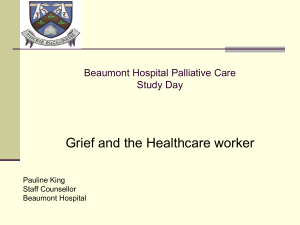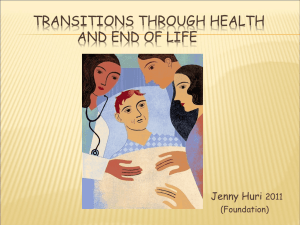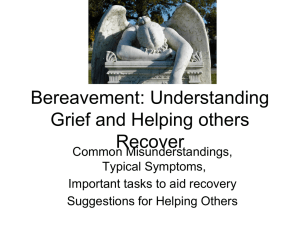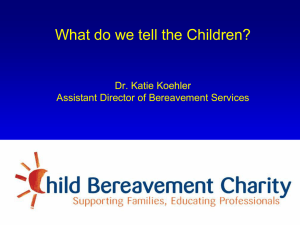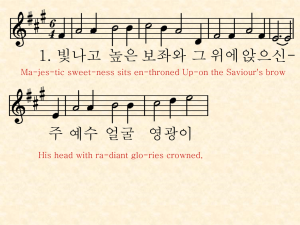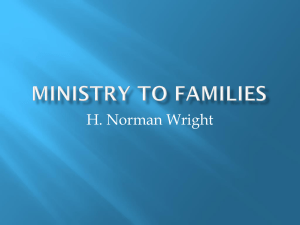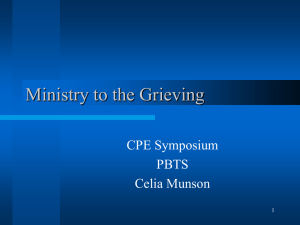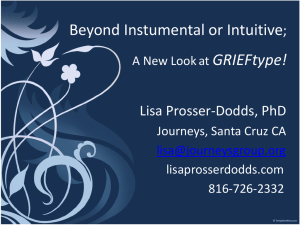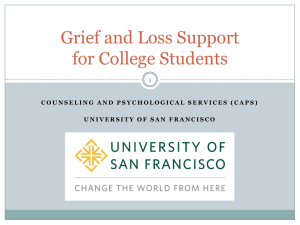Living and working with Loss
advertisement
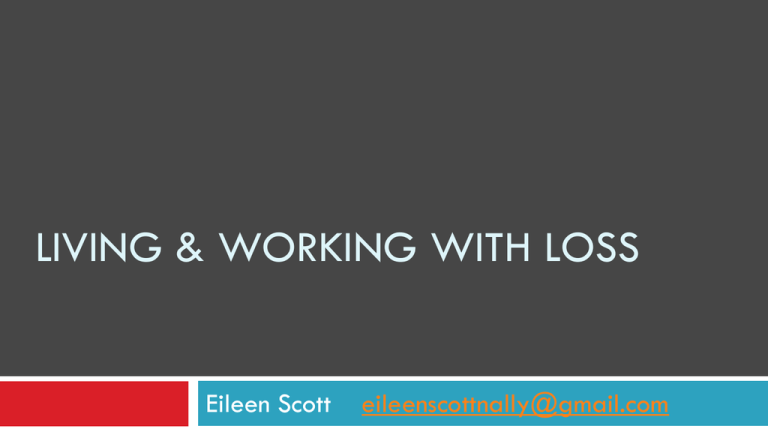
LIVING & WORKING WITH LOSS Eileen Scott eileenscottnally@gmail.com LIVING AND WORKING WITH LOSS Explore the crisis of impending death, sudden death or grief comes, as it can be overwhelming for children, adults and professionals Loss is universal indiscriminate Youth, independence, innocence, a parent, mobility, health, home, purpose, love, work, financial security, sexual drive, privacy, dignity, freedom Supporting Resilience Empowering Lives How can you identify those students in particular need of assistance or support? How can you remain resilient in the midst of this work and all the other demands at work and at home? How can you support students who are dealing with experiences of loss? What language, strategies and coping mechanisms do you have WORKSHOP PLAN Theoretical Framework Anticipatory Grief Grief Work Murray Parkes Case Study Motivational Interviewing Active, Empathic and Reflective Listening Strengths-based practice Defence/Coping Mechanisms Enhance existing skills and resilience by exploring ways of engaging with students experiencing Loss Resilience? The capacity to cope with change and challenges and to bounce back during difficult times – get flak from a colleague bounce back after a short while Seeing defenses as coping mechanisms/strategies rather than as obstacles to be overcome Look at how we perceive resistance - transforming resistance into resilience From Resistance to Resilience Reluctance – not committed to change Resignation – too late for change Rebellious – don’t tell me what to do Rationalisation – over intellectualise Theoretical Perspective Anticipatory Grief What is anticipatory grief? Anticipatory grief is what happens when we know there will be a loss, but it has not yet occurred. Applies to illnesses like end stage Parkinson’s or when a person’ cancer is no longer curative, It can be a time for families to experience and witness the joys and struggles associated with illness, dying and death. Anticipatory grief allows time To resolve any regrets, To make amends, To let go of anger or guilt or To continue as before. Phase I Anticipatory Grief In this stage, an individual and their family start to realise that death is inevitable and there is no expectation for a cure/recovery. It can be a time of questioning, of reviewing life, as well as a time of uncertainty, isolation and loneliness for all the family. Sadness and depression are often associated with this first stage of grief. Phase 2 What’s going on at home? For the person who is sick, their insight and awareness may be increased or intensified, they may have their own fears of death, dying and the future for themselves and their family and friends. The person who is sick may be very astute to emotions expressed verbally or non verbally by those around them, be they health care professionals, family, friends, neighbours…... Family members may have regrets about arguments or time not spent together or guilt about their own good health or old age. Phase 3 Family may rehearse the death. The physical process of death and what may happen after death is discussed, such as laying out the body, the funeral and the burial arrangements. It may be the first “big” death in the family. The person who is sick may have to make tough decisions i.e. about their children's’ future, their own belongings, their home, making their will. The sick person will be saying goodbye to life, to family and friends….. How is this for your student? Phase 4 Anticipatory Grief In the last phase, family members may be imagining what their lives are going to be like without the person that is dying. When a child is dying parents may think about the unused toys left behind, missed graduations, birthdays, or the wedding and grand children that will never be. The person dying may think about life after death, review their own spiritual and religious beliefs. They may also try to imagine what it will be like for their family to live without them. What questions might they ask you? Will he get better? Its not looking good for him? I don’t think he is getting any better? Has he long? Its time for him to go. How will we cope without him? I need to sort things out. Empathic Opening Responses? I would like to help you From what you have told me your dad sounds very ill, and has been getting weaker over the last few weeks From what you just said it seems your dads condition has gotten worse You seem worried that he is getting weaker I would like to talk to you about that but I really don’t think I am skilled enough to, can I ask someone else to join us You sound really worried……….. I would like to talk to you about that, can I come back to talk to you when I have finished.. I don’t know, how is your dad today… Analysis What is he going through emotionally, spiritually and physically? What is important to the student What do you know about him, his parents, his siblings, the family, the illness, their past crisis’ and how they coped? What might you not know? Who can help/support them? What do you know about their discussions with other professionals and family members? Analysis Why did they ask you? What time of the day is it, 3pm, 8am 9pm; is this significant for them, for you?. Do they want support as opposed to being alone with their thoughts Where are they asking - in a busy corridor, in car park, in your office, after school, how does the environment impact on them and on you? Colm Murray Parkes Models of Grief Alarm & Numbness This is the initial reaction to the news of the loss which can persist for sometime. Acts as a “defense mechanism” Alarm can be related to “how will I cope” SEARCHING: Trying to retrieve what has been lost. In ‘pangs’ of grief, the bereaved may call out for the deceased. May physically search for the lost person in places associated with the person Colm Murray Parkes Models of Grief MITIGATION: What will make the pain less Bereaved may avoid people/places that will act as reminders Most people idealise the deceased, society encourages it. ANGER AND GUILT “Why did you do this to me”? May see pain of grief as a punishment. Often seek someone to blame e.g. God, hospital. Anger not always directed towards what gives rise to it – can result in isolation or a withdrawal of support. Self reproach – “ I should have made him go to the doctor sooner” Colm Murray Parkes Models of Grief GAINING A NEW IDENTITY: Loss of identity inherent in bereavement “I feel as if part of me is missing’ Change of roles can make one feel insecure/inadequate Identification with the deceased (behaving and thinking like the person who has died) Factors that complicate grief Children or adolescents in the immediate family. Dependant family members- disabled, elderly, sick Loss of primary care giver/constant companion/emotional support. Loss of financial provision. Loss of home, feared or actual Anxiety about making decisions. Family unable to share feelings. Reluctance to face facts of illness or death. Marital or family discord. Memories of uncontrolled pain, nursing difficulties or emotional distress during the individuals illness. . Presence of concurrent life crises. Difficulty in dealing with previous loss Excessive or prolonged emotional reaction, mental illness or suicide risk. Self-care difficulties. Lack of spiritual support. Lack of community support. Distress over changed body image or personality before death. Absence at time of death: did not say goodbye. Violent death or suicide. Factors that influence the grief process Who the person was. The nature of the Attachment. The Mode of death. Patterns of communication already in the family Personality variables of the bereaved. Level of support people have. What are their strengths Case Study Motivational Work In order to face up to problems people usually feel that they have more to gain than to lose by doing so, and that there are effective solutions There are three main reasons we do things 1. Because we must do them 2. Because we think we ought to do them, 3. Because we want to do them Aims The aim of motivational work is to help the student move from “must attend” to “want to change and be a better person” Motivate or encourage students to engage, to find hope and support and to strive for achievable goals To achieve this we must listen The Basics of Reflective Listening Give up all your preconceived ideas and your subjective opinions. Put little or no emphasis on right and wrong or good and bad. Usually when you listen to a statement, you hear it as a kind of echo of yourself. You are actually listening to your own opinion. If it agrees with your opinion you may accept it, but if it does not, you will reject it or may not even really hear it. Zen Mind Beginner’s Mind Suzuki The Basics of Reflective Listening To listen all you have to do is quieten the mind Listening, following, is not jumping ahead of what you are hearing, nor is it reading your own conclusions, imagining solutions to potential or real problems. It is hard not to offer advice or suggestions, especially if you care about the student. It can be difficult to listen when you hear something unsettling, that threatens you, when your brain seems hardwired in a fight or flight response. Harriet Lerner LISTENING, FOLLOWING … Active: summarising, repeating, paraphraising, clarifying, checking out, validation – to acknowledge and try to understand their unique perspective, reflecting back – it sounds like your feeling really…. Empathic is freeing yourself up inside enough to see, understand and experience life through anothers’ being. Become aware of the persons’ private inner world of perceptions, conscious and blocked feelings, and the meanings and significance they ascribe to these perceptions and feelings. Reflective question, allows the student space and time to reflect and challenge himself. How did you feel about yourself being angry so much of the time Questions: problems to avoid Asking several questions at once Making statements when it would be better to ask a question Telling someone what their problem is Asking leading questions – gives away your thinking Vague or meandering questions Making value judgments or statements about the value of his insight e.g. you have been brave to say what you have said or that must make you feel bad. The focus needs to be on his own evaluation. Avoid the word honest, use you have been more open today – leaves the door open Jargon or phrasing Asking a question without first thinking of how you will phrase it The labeling trap – you are in denial Criticising, shaming or blaming – implied or explicit Confusing therapeutic conversation with the rules and habits of social conversation Bad habits e.g. would it be fair to say… isn’t it the case that.. Are you happy with that Motivational Questioning Technique Simple repetition – allows the person to go on and say the next thing Silence, pausing and waiting Partial repetition with probe – say more about… Unfinished repetition- because.. and… Simple reflection – I notice that you talk a lot about how you were feeling angry.. Amplified reflection – it sounds like you are saying that you had no choice at all, that you had to steal the car Verbal underscoring – lets pay attention to that important point that you just made. Shifting focus, gives you more control over the process and helps keep on track. Helps keep the student focused on the task, and helps them to structure their thinking- I’ll ask you to pause there so that we don’t lose track of something important you said a moment ago. When you said… Colombo Technique / Socratic Questioning Asking naive questions that lead from one step behind: can you help me understand…? Withhold your expertise and allow the person to fill in the blanks of your understanding. What are the other options that you could think about? What was the effect of that thinking/behaviour? The next time you are angry what would be a better strategy for you? Colombo Socratic Examples Socratic questions are those designed to lead the individual to make his own discoveries and insights based upon a series of incremental questions and answers. Like invitational questions. Participants are more likely to integrate knowledge they come to through their own thought process rather than that which is delivered or imposed upon them Which way do you think is the best way? What might be a different way to see that? How might other adults see that problem? What might X think if he /she heard you say that? What went well recently? START FROM A PRINCIPLE OF STRENGHT Principle start from Your Strengths Internal Strength: Quality that you value in yourself Interpersonal Strength: Who gives you strength – family, alive or dead Transpersonal Strength: Bigger than humanity –spiritual, religious, nature, music, art Other Strengths : Past accomplishments, things you like to do, sense of place, belonging
